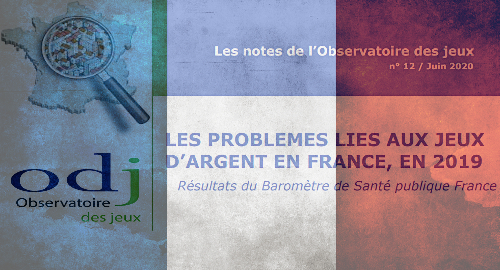 Gambling participation is on the decline in France but the ranks of problem gamblers is on the rise, presenting a dilemma for the country’s new gambling regulatory body.
Gambling participation is on the decline in France but the ranks of problem gamblers is on the rise, presenting a dilemma for the country’s new gambling regulatory body.
A new report by Observatoire des jeux (ODJ), a French government agency tasked with monitoring the nation’s gambling activity, found that 47.2% of over 10k respondents admitted to engaging in some form of gambling in 2019. That’s a significant decline from the 57.2% who admitted gambling in the 2014 survey.
However, the 2019 report showed 1.6% of gamblers displayed signs of excessive gambling activity – twice the 0.8% rate of 2014 – while a further 4.4% were deemed to be at moderate risk of becoming problem gamblers, up from 3.8% in 2014.
Extrapolating these figures to the population at large, 0.8% (370k) of French adults can be considered problem gamblers while another 2.1% (1m) are at moderate risk of earning that dubious designation.
What’s more, the ODJ claims these 6% of problem/at-risk gamblers accounted for 38.3% of all gambling spending last year. ODJ notes that these results “cannot be considered satisfactory” and will need to be monitored closely over the next few years.
Lottery games remain the most popular gambling activity, so while the problem gambling rates among lottery players remains the lowest among product verticals at around 1%, the sheer number of lottery players puts that category in first place for the overall number of problem gamblers.
To no one’s surprise, lottery scratch games were more than twice as likely to produce problem gambling activity (1.2%) than traditional draw games (0.5%). The ODJ claims this area will require greater scrutiny following the recent privatization of the former state-run lottery and retail sports betting monopoly Française des Jeux (FDJ).
Poker and casino games were each around three to four times more likely to produce problem gambling activity than lotteries, while sports and race betting were five to six times higher than lotteries.
As with the lottery stats, separating specific products within a category shows where the bulk of the problem lies. For instance, slot machines were nearly three times more likely to produce problem gambling behavior than other casino games.
On a demographic basis, being young, male and of a ‘modest’ level of education were among the key predictors of developing problem gambling behavior. Interestingly, income level wasn’t a significant differentiator.
In 2019, around 7.1% of French adults gambled online in some capacity, up from 4.2% in 2014. Among active gamblers, 16.1% had done so online at least once last year, up from 7.3% in 2014.
But online gambling is losing its stigma as the main source of problematic activity. In 2019, gambling online doubled one’s likelihood of displaying problematic activity. In 2014, this multiple was closer to 4.5.
There are also distinct differences in the types of online play that lead to greater levels of problematic activity. For instance, online lottery scratch card players were three times more likely to develop problems than those who bought scratch cards at a retail outlet.
Surprisingly, online casino players were only twice as likely to develop problems than their land-based counterparts, while online sports bettors were actually less likely to develop problems than land-based bettors.
France recently underwent a regulatory shakeup as L’Autorité Nationale des Jeux (ANJ) assumed oversight of all things gambling. Similarly, the ODJ’s remit is being transferred to the Observatoire Française des Drogues et des Toxicomanies (OFDT).